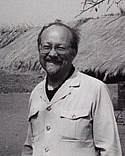| |
Back to Index
Requiem
for a reporter
Maureen Johnson
August 04, 2006
http://www.zwnews.com/issuefull.cfm?ArticleID=14919
 |
| The
late Michael Hartnack ©Trevor Grundy |
 With
the death of Michael Hartnack, Zimbabwe has lost a fine and brave
journalist, an indefatigable reporter and an insightful columnist
who did his job, despite the inherent dangers and official harassment,
simply because it was the right thing to do. Above all, he was a
journalist of integrity. Mike-s friends and colleagues have
lost a charming, clever and kind man - ever generous in sharing
his huge knowledge of the country where he lived and worked for
some four decades; and equally generous with his care and concern
for others. Through power cuts, water cuts, fuel queues and all
the rest that are part of daily life in present day Zimbabwe, Mike
characteristically remarked in a recent email to a friend that he
was one of the lucky ones. "The unlucky ones are out there
in the freezing night dying at 3 200 a week, which is a lot more
than Lebanon." Through the trials and turmoils of Rhodesia
and Zimbabwe, his love for the country endured. It was, he once
said, "the only place that I have ever felt alive." With
the death of Michael Hartnack, Zimbabwe has lost a fine and brave
journalist, an indefatigable reporter and an insightful columnist
who did his job, despite the inherent dangers and official harassment,
simply because it was the right thing to do. Above all, he was a
journalist of integrity. Mike-s friends and colleagues have
lost a charming, clever and kind man - ever generous in sharing
his huge knowledge of the country where he lived and worked for
some four decades; and equally generous with his care and concern
for others. Through power cuts, water cuts, fuel queues and all
the rest that are part of daily life in present day Zimbabwe, Mike
characteristically remarked in a recent email to a friend that he
was one of the lucky ones. "The unlucky ones are out there
in the freezing night dying at 3 200 a week, which is a lot more
than Lebanon." Through the trials and turmoils of Rhodesia
and Zimbabwe, his love for the country endured. It was, he once
said, "the only place that I have ever felt alive."
He was born in Barotseland
in then Northern Rhodesia and died, aged 60, in Harare on Aug. 2
after suffering a massive stroke. Apart from secondary schooling
in England and a spell on a Cambridge newspaper, his life was in
southern Africa, and southern Africa was his life. I remember him
when he was a young reporter on Iana (later Ziana) in the early
70s. He was the one whose enthusiasm never flagged; whether it was
a tedious parliamentary debate about what could only seem irrelevancies
as the Rhodesian Front took the country inexorably toward civil
war, a meticulously researched obituary on an obscure black nationalist
figure, or a town councillor-s speech. Former colleague Heather
Silk put it this way: "I actually can-t imagine this
country without Mike Hartnack recording our lives; without us being
able to tap into that elephantine store of historical facts, and
the riveting trivia he had ferreted away . . . a thoroughly good,
God-fearing, gentle soul."
He worked on The Rhodesia
Herald, Ziana, and then freelanced for South African newspapers,
including Business Day, and for The Associated Press, the London
Times, and Deutsche Welle. "Michael was an accurate, sensitive
and incredibly able correspondent. We will all miss him terribly,"
said DW African editor Susan Killick. His weekly columns in South
African newspapers, including the Natal Witness, Eastern Province
Herald, Cape Times and Daily Despatch, provided a unique chronicle
of his troubled country. In 2003, Mike received an honorary doctorate
from Rhodes University which cited his working life "in service
of the truth and the vision of a just and non-racial Zimbabwe, displaying
courage and integrity." Rhodes Public Orator, Prof. Paul Walters,
described Mike as an "outstanding role model . . . for journalists
working under repressive regimes anywhere in the world."
And then there were things
no one would notice. Mike did them because he was quite simply a
good person and a devoted family man. Anne, his wife of 33 years,
and their children, Richard, Andrew and Jennifer, were his mainstay.
One thinks of him giving time and practical advice to an American
who wanted to donate a bicycle to a child at a mission school; or
a spontaneous offer to store for free in the garage of his Marlborough
home the furniture of a dispossessed white farmer. His last published
column, written July 24, has a special poignancy. No great occasion,
just the funeral at Epworth Mission of a 79-year-old with whom Mike
had worked as a court reporter on the Rhodesia Herald 40 years ago.
He described the congregation staring as he squeezed into the church,
"one last, solitary, surviving white face from all the host
of Andrew Kanyowa-s former colleagues."
They had known each other
at the apogee of white supremacy. Through Andy "I became aware
that it was not possible for any African to live in Rhodesia without
being daily, hourly reminded he belonged to a conquered people,"
wrote Mike. And how it is now. "The new elite holds its country
cousins in a new kind of servile relationship . . . Teenage girls
work for wealthy urban families under conditions close to slavery.
New farm owners pay their labourers far less than the statutory
minimum wage, and erratically . . . This is not the sort of society
for which black or white people like Andrew Kanyowa hoped and worked."
Andy, Mike added, was "gentle, understated, subtle, tasteful."
Mike too.
Michael
Hartnack (1945-2006)
Please credit www.kubatana.net if you make use of material from this website.
This work is licensed under a Creative Commons License unless stated otherwise.
TOP
|

